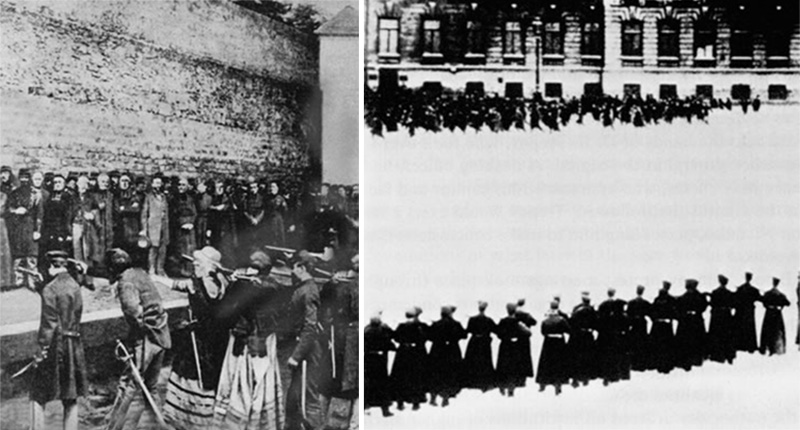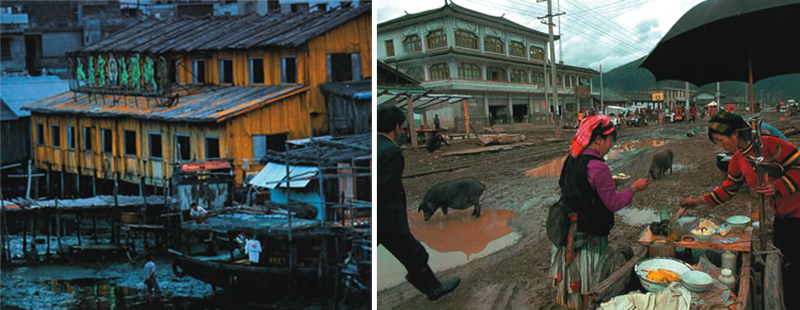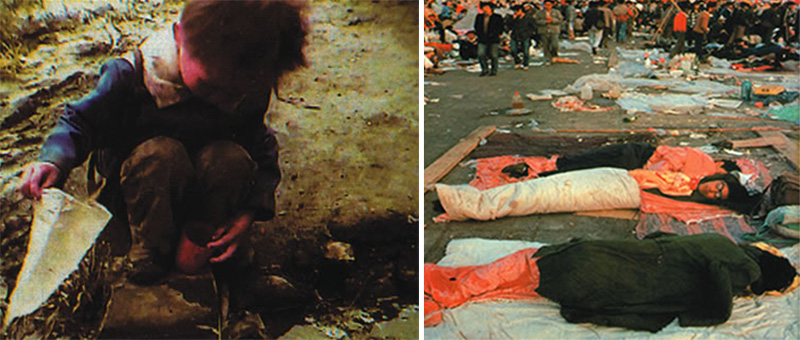Cruelty and Disorder in Disbelieving Societies
As we analyzed in the previous chapters, in every corner of the world, Kosovo, Kashmir, Palestine, Chechnya and in many other countries, Muslims are subjected to uninterrupted and merciless cruelty and unending travails. It would be wrong to believe that the ways these proceed do not relate to one another. On the other hand, attributing these clashes to the innate political and geographical traits of individual countries would prove to be a poor understanding. All wars and violence that have occurred in world history, no matter where, indicate the existence of people who seek to take advantage of them. All Muslims should see and be aware of these incidents. Otherwise, one risks seeing world events as spontaneous accidents requiring no solution. In a hadith, Allah's Messenger, the Prophet Muhammad (saas) also referred to oppression, and said that it will be "a darkness on the Day of Resurrection."19
|
If Allah were to punish people for their wrong actions, not a single creature would be left upon the earth, but He defers them till a predetermined time. When their specified time arrives, they cannot delay it for a single hour nor can they bring it forward. |  |
The 20th Century has especially been a time marked by unprecedented brutality. Among the movements sustaining wars and brutality, communism – which advocates a materialist philosophy and entirely refuses religion, moral values, and family – is the foremost. In countries where communism has control, history provides more than sufficient evidence of how wretched a life disbelief brings to societies. In order to have a clearer insight about this brutal system, only a brief look at the history and the current situation in Russia, a country that remained under communist rule for decades, will be helpful.
The Traces of Communism – a System Based on Disbelief – in History
 |
| Friedrich Engels and Karl Marx |
Karl Marx and Friedrich Engels, the founders of dialectic materialism and mentors of communism, were both devoted atheists. Maintaining that all forms of improvement in the world are attainable through conflict, they believed they could achieve their goals only through a communist revolution. They both felt a deep-rooted hostility towards religion, and saw the elimination of religion as a necessary condition for their views to prevail. Marx and Engels believed the communist movement could only start once faith in Allah and the obstacle of religion were eliminated. Marx was never able to put his views into practice. After his death, Lenin carried out the revolution.
Vladimir Lenin, who initially seized power after a relatively bloodless coup de etat, and consolidated it after a bloody civil war between his communist militants and the remains of the aristocratic armies, provided hints about the policy that would be pursued following his rule. In his time, those resisting him and the communist system were ruthlessly executed. The civil war lasted for three years, and it brought complete devastation to Russia. Following this bloody war, Lenin founded the first totalitarian single-party dictatorship in the world.
Lenin's time was one of overall ruin for Russia, especially in terms of its economy; additional taxes were imposed on people who were already very poor. Starvation and misery increased steadily. His policy brought extensive nationalization, food rationing, and control over industry, and no one could run the risk of resisting his policies since they well knew the end of those who even attempted it.
By the time Lenin died in 1924, the policies he pursued earned him the intense hatred of people, including some of his closest associates. His successor as the chairman of the Communist party was Josef Stalin, the bloodiest dictator world history has ever known.
 |
| During the reign of the communist leader Lenin, tens of thousands of innocent people died of hunger. The famine which was prevalent during the time of Lenin and Stalin happened simply because resources for the nourishment of the public were spent on ideological purposes. |
People's experiences of the thirty years during which Stalin ruled have revealed, over and over again, the utterly merciless nature of the communist system. There was no end to murder, massacre and torture. His "communism project" became an utter grief-ridden experience for the public; millions drifted into starvation and misery, villagers were used for forced labor and people were severely oppressed. Meanwhile, all forms of religious practices were outlawed. Stalin started by confiscating the fields of villagers, who made up 80% of the total Russian population. As a part of the policy of nationalization, party officials collected all the villagers' crops, causing famine to millions of women, children and elderly people. In Kazakhstan alone, 20% of the population died of hunger. In the Caucasus, the death toll rose to more than one million.
Thousands of people who attempted to resist these policies were interned in labor camps in Siberia. In these camps, where forced labor was extremely arduous, the majority of captives did not escape death. Thousands of people were executed by Stalin's dreaded secret police, the NKVD. Forced emigration became part of the Stalinist policy; millions of people were relocated, leaving their homelands for remote parts of Russia.
Stalin was responsible for at least twenty million deaths throughout Russia. From what historians relate, Stalin derived pleasure from such brutality and, in his Kremlin office, very much enjoyed examining the reports of the death tolls coming in from the labor camps.
Terror in Stalin's time was not only directed at those who voiced objections to the system or intellectuals. Under the attacks of communist militants, everyone was under threat. Indiscriminately, masses were interned in the "Gulag", a network of forced labor camps, where many were executed. Stalin ensured an absolute power over masses through terror. Thirty years of his dictatorial rule left behind nothing but impoverished masses.
 |
| Stalin was responsible for at least twenty million deaths throughout Russia. From what historians relate, he derived pleasure from such brutality and, in his Kremlin office, very much enjoyed examining the reports of the death tolls coming in from the labor camps. Terror in Stalin's time was not only directed at those who voiced objections to the system or at intellectuals. Under the attacks of communist militants, everyone was under threat. |
Russia is a clear illustration of disbelieving societies in which a contented and happy life is unlikely to exist. That is because, due to its innate nature, disbelief tempts people into committing all sorts of crimes for personal benefit, including murder, or even subjecting children to violence for pleasure. The Russian society of today bears witness to the destructive effects of the anti-religious system from which people suffered for decades. Degeneration is the legacy of this system. Reversing this situation is only possible through teaching the values of Islam to all people and helping them to regain their spiritual values.
 |
| In communist societies, the inevitable consequences of disbelief are hunger, misery, disorder and violence. |
The Ongoing Oppression in Mao's China
Stalin put the project of communist revolution into practice in Russia leaving behind twenty million dead. This bloody regime in Russia was imitated by another communist regime in China.
In 1949, under the leadership of Mao Zedong, communists took power in China after a bloody civil war. Like his close ally Stalin, between 1949 and 1976, he established a repressive and bloody regime. Countless political executions took place in China. The army was composed of communist troops of men and women. In later years, young militants, called the "Red Guards" by Mao, threw the country into even more terror.
 |
| In an effort to conceal his dark reality, Mao used posters clearly representing him as an idol. |
Economic deterioration in Russia had its parallels in China, by means of the principles adhered to under the name of "socialist change and equal rights." The same scenario was repeated in China; people were no longer entitled to their rights, and all their property was confiscated for the benefit of the state. In brief, the communist regime in China, which was presented as the refuge and the savior of the masses, seized fields, animals, crops and people's property just as it had in Russia.
Nationalization was presented as a prerequisite of "socialist change." "Social justice" only worked to enrich the people in power and those flattering them. Meanwhile, the public whose "rights were (supposedly) protected" starved to death. Economic problems became more burdensome, requiring fundamental reforms; yet, every reform only added to the misery and social disorder in the country. Each failure in economic reform claimed thousands, even millions of lives. In this country stretching over a vast geographical area, Mao essentially carried out a genocide of his own people, especially minorities.
The communist party hierarchy and its dictator, Mao who held absolute authority in all domains of life, closed China against all external influences and held the press and communications under strict control. Any criticism or protest brought against government policies ended in “re-education” or execution. Authors, artists and scientists who had worked on the culture, history and language of minorities were gathered and executed by this bloody dictatorial regime. To this day the world, including the UN, cannot collect accurate information about incidents taking place in Red China, such as the case of executed Uigur Turks.
Elimination of religious beliefs is the main goal of every communist regime. To this end, a systematic policy of repression and propaganda is employed. Religious beliefs are replaced by philosophies developed by idolized leaders. This was also the case in China, one of the major anti-Islamic countries in the Far East. Beginning in the period of Mao, the rulers of China prohibited every sort of religious practice. Imams were subject to severe torture and mosques were closed. Religion, considered to be the greatest obstacle to the materialist system, became a subject discussion of which was banned.
 |
| The new generation was indoctrinated to be hostile towards nation, religion, culture and history, which constitutes part of Marxist state policy. |
People in China were steadily indoctrinated into the infallibility and superiority of the totalitarian leader. In schools and universities, the "Little Red Book", in which Mao extensively explains his bizarre philosophy, was incorporated into the curriculum. Young children and the youth were instructed in the materialist philosophy, which presents the concept of Allah as a major hindrance to human development. People were encouraged to kill one another, even their own mothers, if it was in the interest of the communist system.
Communist ideology sees the concept of family as against its own purposes. To this end, millions of families in China were broken. For the so-called interests of the state economy, families were separated, children were taken to orphanages and family members could only gather once a year.
These are all important issues, since today communism is still propagated around the world. The end of a country in which communism is adopted will not be different from Russia, or one day, China. The only way to protect a nation from this system marked by massacre, violence, hunger and inhumanity, is to make people – especially young people – conscious of religion. Disbelieving people who are unaware of the true religion and consequently do not know the values brought by the religion are prone to communism. This is the reason why materialists consider religion to be the most important and efficient power against them. Explaining the true religion, purified from all bigotry, to them as well as providing the evidence regarding the defects of the philosophy of communism are among the precautions one can take to protect a nation against such a disaster.
 |
| The mass executions carried out by the Khmer Rouge in Cambodia, another communist country, reveals the cruel and inhumane nature of communism. |
The communist regime deceived the masses by presenting communism as "the only way to true salvation." "To attain the goal of communism" it inflicted inhumane torture on millions of people. Amnesty International often reports the continuing brutal treatment and torture of so-called "ethnic communities" and especially Muslim minorities living within the Chinese borders. Prisoners are not allowed to defend themselves and are constantly forced to hold their heads in a bent position. It is known that Muslims are punished with cruel and inhumane methods.
Historians now argue whether Communism killed two hundred million people in total or "only" eighty million.
The Detriments of the Anti-Religionist Systems for People
1. All reasoning based on moral values and conscience are eliminated, and societies are oppressed under totalitarian regimes. Under these regimes, people are not entitled to enjoy their fundamental rights and freedoms. Moral values are entirely refused, and groups with vested interests dominate society. The disbelieving system disallows any activity not serving the interests of the prevalent disbelieving system.
2. People are indoctrinated into believing that the dictator is infallible and that his decisions are relevant. In all anti-religionist regimes (fascism and communism), the perverted practice of idolizing the leader is common.
3. Freedom of thought and religion are entirely curtailed. Entrance to mosques, churches and synagogues is disallowed, and communication of the religion is prohibited. A special fund is allocated from the national budget to combat religion.20
4. The state holds complete control over the economy. Private investment is disallowed. Factories, means of production, manufacturing facilities and banks are nationalized.
5. Communist officials and soldiers confiscate private real estate. The fields and the villagers' crops are nationalized "in the best interests of the country:"
6. Hunger and starvation claim millions of lives, including women, children and the elderly. The system created poor and disadvantaged people, imposing hard lives on everyone. In this life, buying a loaf of bread, for instance, meant waiting in queues for hours.
7. People were interned in labor camps and executed en masse. Those remaining were used for forced labor under very harsh conditions. Those unable to adapt to working conditions were exiled to Siberia.
8. Rebellions were put down bloodily by communist militants. Insurgents were shot dead before the eyes of the public.
9. Those opposing the system or offering criticism, be they politicians or intellectuals, were executed.
10. Those holding power reveled in extravagance, while ordinary people led their lives in misery. For instance, when the Communist Party held power, the difference between the salary of a worker and a member of the Communist Party was between 25 to 30 thousand rubles. The salaries of Communist Party members were 25 to 100 thousand rubles. The majority of the public had only a salary of 150 rubles. Moreover, Communist Party members had mansions, cars and access to free health services. None of these benefits were available to the public whose labor formed the backbone of the national economy.21
11. The police forces of the oppressive regime terrorized the public. The public lived under constant threat.
12. The Communist Party committed the country to endless cycles of civil strife, rioting and disorder.
13. The oppressive and totalitarian system also had its influence on schools. According to Lenin, education should not be objective, impartial and isolated from politics. In his address at the First Congress on Soviet Education on the 25th of August 1918, he stated that the main purpose of education is to remove the bourgeoisie. He explicitly declared that there is no education outside of politics and to claim otherwise is sheer lies and hypocrisy.22 The purpose of education is to raise faithless and morally weak generations numbed into serving the interests of communism.
14. Youth were brainwashed with disbelief, and the system raised militants instead of peaceful generations.
15. The concept of the family was eliminated. Babies were separated from their families and raised in orphanages. The concept of the family was considered to be against the "interests of the state." In Communist Party meetings, views such as "The revolution is doomed to remain weak as long as family ties and the concept of the family exist" were expressed.23
16. Arts and sciences do not find an environment in which to flourish under communist regimes. A major portion of the national budget was allocated to armaments, mostly used for the subjection and execution of the masses.
17. Youth were not provided with any purpose in life and so they ended up with soaring suicide rates. The system itself pushed teenagers to drug and alcohol addiction.
18. Freedom of the press was entirely curtailed. Publishing and broadcasting were only allowed as long as they praised the system and the leader. Otherwise, they were silenced.
Massacres by Communist Leaders |
 |
| Bolsheviks led by Leon Trotsky shooting members of the White Army (above). |
 |
| The massacre known as "Bloody Sunday" (middle-left). Innocent people executed during Stalin's regime (middle-right). Clergy shot dead during the Paris commune. (right) |
The Misery of People in Communist Countries |
 |
 |
| In communist societies, the daily lives of people are full of difficulty and trouble. For instance, the child in the picture tries to drink muddy water since he cannot find drinking water. In other pictures, the misery disbelief brings is clearly seen. |
Footnotes
19. Sahih Muslim, Book 32, Number 6248
20. Ali Bulac, Çağdaş Kavramlar ve Düzenler (Contemporary Concepts and Orders), p.108
21. Mahmud Ahmet, Islam Iktisadı (Islamic Economy), p.80
22. Alija Ali Izetbegovic, Islam Between East and West, p. 102
23. Ali Bulac, Çağdaş Kavramlar ve Düzenler (Contemporary Concepts and Orders), p.114
- Introduction
- The Purposelessness of Disbelieving People
- What Happens if Fear of Allah Does Not Exist?
- Living by the Qur'an Brings about Real Justice
- What is Experienced in Political Life
- The Impact of Disbelief on the Economy
- The Values of Religion Commands Us to Protect the Needy and Orphans
- Moral Degeneration in Disbelieving Societies
- Murders Caused by Disbelief
- Wars All Over the World
- "The Fanatical Rage": Racism
- Cruelty and Disorder in Disbelieving Societies
- Conclusion
